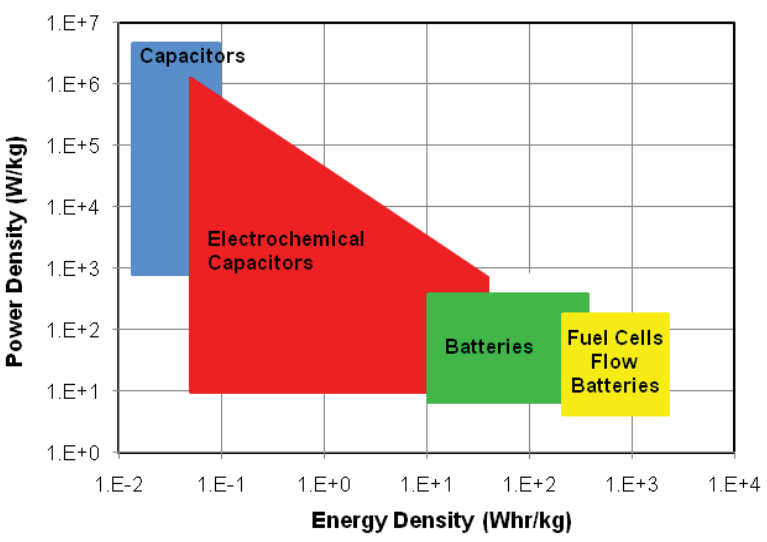How to store energy is crucial to our daily life. A wide array of technological approaches have been developed to managing our power supply in order to create a more resilient energy infrastructure and bring down the costs to utilities and consumers. Energy storage systems are the set of methods and technologies used to store electricity, include batteries (both conventional and advanced), electrochemical capacitors, power electronics, flywheels, and software tools for storage optimization and sizing.
As an energy storage system, battery is widely used in various electronic devices such as mobile phone, laptop, home appliances, etc. A battery consists of positive and negative electrodes, or cathode and anode, that are isolated by a separator and soaked in electrolyte to promote the movement of ions. Depends on electrodes and electrolytes used in the system, and the energy conversion mechanism, there are different types of batteries in the market: Lead acid batteries, lithium-ion batteries, nickel-based batteries, flow batteries/fuel cells, and solid-state batteries. In a conventional battery, the electro-active materials are stored internally, and the electrodes at which the energy conversion reactions occur are themselves part of the electrochemical fuel. The characteristics of the negative and positive electrodes determine both the power density (e.g., electrical, transport, and catalytic properties of the active material and non-reactive materials) and the energy density (e.g., mass of active materials) of the battery. As a battery converts its chemical energy to electrical energy, electrodes are consumed and undergo significant physical and chemical changes which affect its electrical performance. If more energy is needed, then more battery modules with identical components are required. As the amount of electro-active materials increases in a battery, more raw materials such as current collecting materials, electrolyte, separators, and enclosure materials are also needed.
Lithium-ion batteries have proven to be an efficient energy storage system in terms of their energy and power density, reliability and cyclability. Today the state-of-the-art lithium-ion batteries offer volumetric and gravimetric energy densities up to 770 Wh l−1 and 260 Wh kg−1, respectively, which was not expected 10 years ago. On the other hand, there is an ever-increasing demand for batteries with even higher energy density as well as high power density. New active materials are being tried, each offering unique attributes but none delivering an ultimate solution. Flow batteries are those where the energy is stored externally and directly in the electrolyte solution and are introduced into the device only during operation. This provides longer cycle life, quick response times. Solid-state batteries that use solid electrolytes instead of liquid ones could also offer both high energy and high power density. While slow kinetics is considered the Achilles’ heel of solid-state systems.
 Powder and energy densities of different energy storage systems.
Powder and energy densities of different energy storage systems.
Reprinted from Nguyen, T., et al. The Electrochemical Society Interface 2010.
During years of manufacturing and developing battery materials, our battery science lab at Lifeasible has gained great experience in both manufacturing and fundamental understanding of the battery technology. We offer a full range of battery raw materials, such as anodes, cathodes, electrolytes, capacitors and other advanced chemistry batteries. We also specialized in providing electrochemical storage solutions to impart safety, high capacity, long cycle life, good low temperature performance, quick discharging and charging performance. Please contact us for more information about our professional services such as custom synthesis of cathode, anode and solid electrolyte powders, or scale up your battery manufacturing capabilities from laboratory to industrial scale.
Lifeasible has established a one-stop service platform for plants. In addition to obtaining customized solutions for plant genetic engineering, customers can also conduct follow-up analysis and research on plants through our analysis platform. The analytical services we provide include but are not limited to the following:
Get Latest Lifeasible News and Updates Directly to Your Inbox